| Srl | Item |
| 1 |
ID:
137408


|
|
|
| 2 |
ID:
076668


|
|
|
| 3 |
ID:
099328
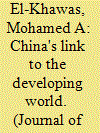

|
|
|
| 4 |
ID:
066948
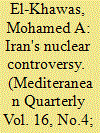

|
|
|
| 5 |
ID:
060640


|
|
|
|
|
| Publication |
Westport, Lawrence Hill and Company, 1969.
|
| Description |
134p.
|
| Series |
National security study memorandum no; 39
|
|
|
|
|
|
|
|
|
|
|
|
Copies: C:1/I:0,R:0,Q:0
Circulation
| Accession# | Call# | Current Location | Status | Policy | Location |
| 016334 | 327.73068/KIS 016334 | Main | On Shelf | General | |
|
|
|
|
| 6 |
ID:
060642
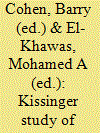

|
|
|
|
|
| Publication |
Westport, Lawrence Hill and Company, 1976.
|
| Description |
189p.
|
| Series |
National security study memorandum no; 39
|
| Standard Number |
0882080725
|
|
|
|
|
|
|
|
|
|
|
|
Copies: C:1/I:0,R:0,Q:0
Circulation
| Accession# | Call# | Current Location | Status | Policy | Location |
| 018439 | 327.73068/COH 018439 | Main | On Shelf | General | |
|
|
|
|
| 7 |
ID:
087851
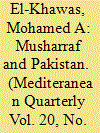

|
|
|
|
|
| Publication |
2009.
|
| Summary/Abstract |
Following a 1999 coup, Pakistan's General Pervez Musharraf ruled by decree with the support of the military. He held a presidential referendum and got his party elected. He amended the constitution to legitimize his military rule. His involvement in the war on terrorism led to the rise of religious extremism, and he persuaded the United States to propose a power-sharing plan. In 2007, Musharraf got himself re-elected by the outgoing parliament, an election subsequently challenged in court. In November, he declared a state of emergency and dismissed Supreme Court justices whom he feared would rule against him. Under external pressure, he ended the emergency after he had secured the presidency and resigned from the military. In 2008, opposition parties won the parliamentary elections and formed a coalition government. They have not yet reinstated the dismissed judges. They forced Musharraf to resign, but more steps are needed to complete the transition to a true democracy.
|
|
|
|
|
|
|
|
|
|
|
|
|
|
|
|
| 8 |
ID:
088411
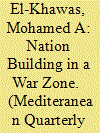

|
|
|
|
|
| Publication |
2009.
|
| Summary/Abstract |
The essay examines Bush's strategies to democratize Iraq. Failure to draft a plan for Iraq's stabilization led to costly mistakes that drove many Sunnis to join insurgent groups, fueling sectarian strife. Holding multiparty elections was a major accomplishment, but it did not lead to national reconciliation. Meanwhile, Bush has given Prime Minister Nouri al-Maliki governmental benchmarks to meet, has sent more troops to drive insurgents out of Baghdad, and has armed Sunni tribes to fight al Qaeda. After reviewing key events, the essay assesses the prospects for the future of democracy in a country where there is neither security nor the rule of law.
|
|
|
|
|
|
|
|
|
|
|
|
|
|
|
|
| 9 |
ID:
095181
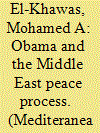

|
|
|
|
|
| Publication |
2010.
|
| Summary/Abstract |
The author examines the steps taken by the new administration to resolve the decades-old Israeli-Palestinian conflict. The search for a solution requires dealing with many players with conflicting interests and contradictory agendas. President Obama's relaunch of the Middle East peace process soon ran into problems. His two-state solution was not endorsed by Israel's Prime Minister Benjamin Netanyahu until June 2009. President Obama's early call for a settlement freeze in the occupied territories was hailed by the Palestinians, but US envoy George Mitchell was able to get Netanyahu to agree only to a partial freeze, which was rejected by Palestinian Authority President Mahmoud Abbas. Obama's subsequent retreat on a settlement freeze shocked the Palestinians, who refused to start the peace talks.
|
|
|
|
|
|
|
|
|
|
|
|
|
|
|
|
| 10 |
ID:
062236
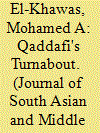

|
|
|
| 11 |
ID:
118578
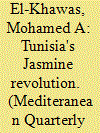

|
|
|
|
|
| Publication |
2012.
|
| Summary/Abstract |
Tunisians were the first in the region to oust a long-time dictator, one who had ruled the country for twenty-three years. It was a genuine popular revolution, started without a leader, and was nonpolitical, nonideological, and nonreligious. After toppling President Zine El Abidine Ben Ali's regime, new political parties were established and free and fair multiparty elections were held, a giant step forward in the march toward democracy. The economy continues to be a deep source of discontent, however. Youth blame the government's inaction for continued unemployment. The Ennahda-led coalition needs to get the right mix of resources to make progress in reducing unemployment. Tunisians cannot do it alone; external assistance is badly needed.
|
|
|
|
|
|
|
|
|
|
|
|
|
|
|
|